Unit 1 Will people have robots (2)
Will-people-have-robots教学设计与反思
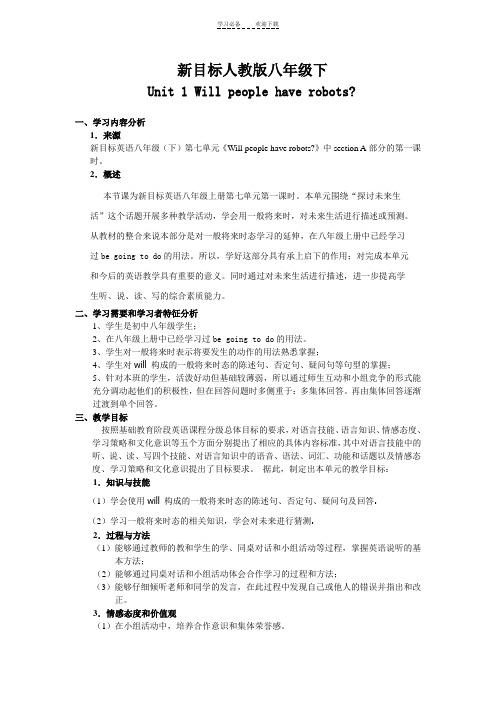
新目标人教版八年级下Unit 1 Will people have robots?一、学习内容分析1.来源新目标英语八年级(下)第七单元《Will people have robots?》中section A部分的第一课时。
2.概述本节课为新目标英语八年级上册第七单元第一课时。
本单元围绕“探讨未来生活”这个话题开展多种教学活动,学会用一般将来时,对未来生活进行描述或预测。
从教材的整合来说本部分是对一般将来时态学习的延伸,在八年级上册中已经学习过be going to do的用法。
所以,学好这部分具有承上启下的作用;对完成本单元和今后的英语教学具有重要的意义。
同时通过对未来生活进行描述,进一步提高学生听、说、读、写的综合素质能力。
二、学习需要和学习者特征分析1、学生是初中八年级学生;2、在八年级上册中已经学习过be going to do的用法。
3、学生对一般将来时表示将要发生的动作的用法熟悉掌握;4、学生对will 构成的一般将来时态的陈述句、否定句、疑问句等句型的掌握;5、针对本班的学生,活泼好动但基础较薄弱,所以通过师生互动和小组竞争的形式能充分调动起他们的积极性,但在回答问题时多侧重于:多集体回答。
再由集体回答逐渐过渡到单个回答。
三、教学目标按照基础教育阶段英语课程分级总体目标的要求,对语言技能、语言知识、情感态度、学习策略和文化意识等五个方面分别提出了相应的具体内容标准,其中对语言技能中的听、说、读、写四个技能、对语言知识中的语音、语法、词汇、功能和话题以及情感态度、学习策略和文化意识提出了目标要求。
据此,制定出本单元的教学目标:1.知识与技能(1)学会使用will 构成的一般将来时态的陈述句、否定句、疑问句及回答.(2)学习一般将来时态的相关知识,学会对未来进行猜测.2.过程与方法(1)能够通过教师的教和学生的学、同桌对话和小组活动等过程,掌握英语说听的基本方法;(2)能够通过同桌对话和小组活动体会合作学习的过程和方法;(3)能够仔细倾听老师和同学的发言,在此过程中发现自己或他人的错误并指出和改正。
新目标英语八年级下册Unit1Willpeoplehaverobots知识点
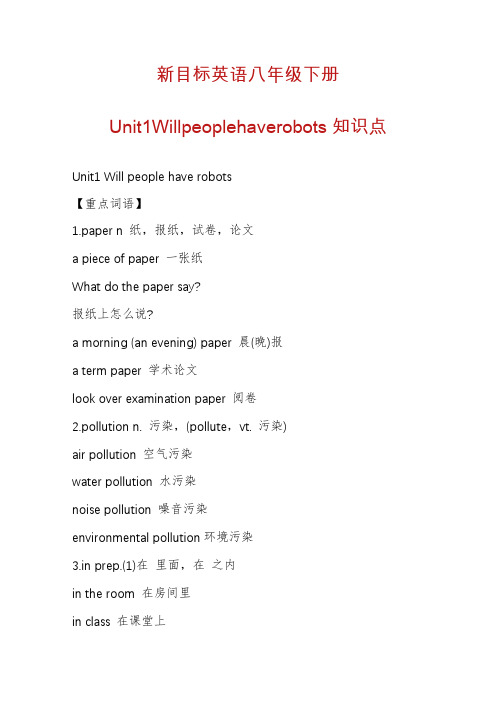
新目标英语八年级下册Unit1Willpeoplehaverobots知识点Unit1 Will people have robots【重点词语】1.paper n 纸,报纸,试卷,论文a piece of paper 一张纸What do the paper say?报纸上怎么说?a morning (an evening) paper 晨(晚)报a term paper 学术论文look over examination paper 阅卷2.pollution n. 污染,(pollute,vt. 污染)air pollution 空气污染water pollution 水污染noise pollution 噪音污染environmental pollution环境污染3.in prep.(1)在里面,在之内in the room 在房间里in class 在课堂上(2)在(某段时间)之间in the morning 在早上in the past 在过去I′ll come back in a day or two我过一两天就会回来in,after,later 接时间段,都可表示“(一段时间)之后”,它们有什么区别呢?①“in+一段时间”指“(将来的)一段时间之后”。
What will you be in five years?五年之后你干什么?We’ll start off in ten minutes.我们十分钟后出发。
②“after+一段时间”或“一段时间+later”表示“(在过去某个时间看来)一段时间之后”。
He went home after two days.他两天后回家了。
Three years later,she had a baby.三年后,她生了一个婴儿。
4.less adj. 较少的;少量的(little的比较级)They buy less beer and fewer cigarettes now现在他们买的啤酒和香烟比以前少了。
初中英语Will-people-have-robots教案

初中英语Will people have robots教案_学习方法网---------------------------------------Unit 1 Will people have robots ?I. Programmes for the unit1. Teaching Goals(1) Learn to make predictions.(2) Learn the Future Indefinite(3) Talk about past present and future.2. Target Language(1) What do you think Sally will be in five years?(2) I think every home will have a robot.(3) Will kids go to school .They ’ll study at home on computers.(4) There will be fewer trees.3. A diagram for Topic WordsQuantities more ,less,fewer…..Future Liferobot, paper, money, free time, pollutionThingsastronaut, rocket, space, station, moon4.A diagram for Topic Thingking and Task-based ActivityTask One : Life in the FutureFuture LifeTask Two: Dream in the FutureTask Three: Future PredictionsII.Teaching time :seven periodsPeriod1Ⅰ.Teaching aims1. Knowledge aims:Ⅰ.words: robot, paper, use , less, fewer, tree, building, space, fly, moon…Ⅰ Conversation:A: Will people use money in 100 years?B: No, they won’t. Everything will be free. Will people live to be 200 years old? A: Yes, they will.2. Ability aims:Ⅰ Learn to talk about the future using will.Ⅰ Learn to make predictions.3. Emotion aims: Learn to study hard.II. Main Points1.What do you think life will be like in 100 years?2.Every home will have a robot.3. Will kids go to school? No, they won’t. They’ll study at home.4.There will be fewer trees.III. Difficult pointsThere will be …IV.Teaching MethodTask-based teaching methodV. Teaching aids: Radio, pictures.ProceduresInstructional Design Modification and RemarksStep1Warming up1)Greetings.2).Free Talk.:Arouse the Ss’ interesting of learning and make a comfortable situation for the students.Step2Pre-task:Learn the key words.Enable the Ss learn to share the information in their groups. Lead in1)Ask students to think about the life in the future , they may talk about it in Chinese when necessary.2)Show the pictures of future and help the students to learn and talk.Step3TasksTask 1: Present and master the main points and difficult points. Enable the students to use the key sentences to finish the task.1)Teacher present the following sentences:T: Will people have robots at home?S: Yes, they will.T: Will kids go to school?S: No, they won’t . They will study at home.T: Will people live to be 200 years old ?S: Yes, they will.2)Ask the Ss to make a list, What will be in the future.3)Ask some students to report.Task 2:Learn to make predictions with There will be…Enable the students to use the key sentences to finish the task..Master the main and difficult points.1). Present the sentence.There will be more/ less/ fewer people. Etc.2).Ask Ss to discuss and do 2a.3). Ask some students to report.Task 3:Arouse the interesting and enable the Ss to predict and learn to work in groups.1)Ask one students to talk about more the future and express their opinions.2)Ss make a conversation.Step4:Post-taskEncourage Ss to make progress.1)Students report the result.2)Teacher appraise those who did well in class.Step5:SummaryConsolidate the knowledge of this unit.1) Go over the key words.2)Revise the main sentences such as:Will people have…?Every home will have a robot.There will be more/less/fewer…3) I agree./ I don’t agree.Step6HomeworkFinish the exercises.Image you are in 2080, what will your life be like? Please write them down.教学反思:Period2Ⅰ.Teaching aims1. Knowledge aims:Ⅰ.words: sun, earth, spaceship, space station, even, pollution… Ⅰ Conversation:A: I think there will be more pollution.B: Well, I don’t agree. But I think there will be fewer trees. A: I agree.2. Ability aims:Ⅰ Learn to talk about the future using will.Ⅰ Learn to make predictions.Emotion aims: Learn to study hard.II. Main Points1. more, fewer, less.2. will not = won’teverything will be free.III. Difficult pointsThere will be …IV.Teaching MethodTask-based teaching methodV. Teaching aidsRadio, pictures.ProceduresInstructional Design Modification and RemarksWarming up Arouse the Ss’ interesting of learning and make a comfortable situation for the students.1. Greetings.2. Free Talk.Step2Pre-task Learn the key words.Enable the Ss learn to image and work in groups.Lead in1. Compare the past, present, and the future.2. Enable the Ss to talk about the future with will.3. Image what your life will be like in the future. Get the Ss to talk in groups and write them down.Step3Tasks Enable the Ss to use will to talk about the future Enable the students to use the key sentences to finish the task.Task 11. Teacher present the following sentences:T: One hundred years ago, people wanted to fly to the sky. They wanted to fly to the moon.Now people can fly in the sky easily. We use rockets to send up the spaceship to the universe. We make the space station. People can live there. In 100 years time, people will live on the moon. …2. Ask the Ss to image what will happen in the future.3. Ask some students to report.Task 2 Enable the students to use the key sentences to finish the task..1. Ss make a survey.people trees cars pollutionfewerless2. Ask some students to report.Learn to use There will be…Task 3 Arouse the interesting and enable the Ss to predict and learn to work in groups1. Ask one students to talk about more the future and express their opinions.2. Do 2c. Ss make a conversation.Step4Post-task Enable the Ss to write.1. Do some exercise.2. Teacher appraise those who did well in class.Step5Summary Consolidate the knowledge of this unit.1. Go over the usages.2. Revise the main sentences .Step6Homework :Enable the students to write with the key sentences they learned.1. Finish the exercises.2. Write down your ideal life. What will your life be like in the future?3. Strengthen the knowledge.Contents on the BbUnit 1 Will people have robots?1. There will be more people in the future spaceship2. There won’t be more cars. sun3. There will be less pollution in the future earth4.. There will be fewer trees. moon教学反思:Period3Ⅰ.Teaching aims1.Knowledge aims:Ⅰ.words: pet, building, fall , parrot, go skating, be able to, dress…Ⅰ Conversation:Five years ago, I was in primary school. Today I am in middle school. In five years I will be in college.2.Ability aims:Ⅰ Learn to talk about the past, present, and the future.Ⅰ Learn to talk about future activities.Emotion aims: Learn to collect information.II. Main Points1.was, be, will be2.played, plays, will play.I think there will be more tall buildings.III. Difficult pointsI’ll= I will, they’ll= they will…IV.Teaching MethodTask-based teaching methodV. Teaching aidsRadio, pictures.ProceduresInstructional Design Modification and RemarksStep1. Warming up Arouse the Ss’ interesting of learning and revise the knowledge learned.1.Greetings.2.Free Talk.3.Listening comprehension.Step2Pre-task Learn the key words.Enable the Ss learn to talk about the past , the present , the futurepare the past, present, and the future.2.Enable the Ss to use the past indefinite tense, the present indefinite tense, the future tense .3.Get the Ss to listen and repeat.Step3TasksTask 1 :Enable the Ss to use will to talk about the past, the present and the future. Enable the students to use the key sentences to finish the task.1.Teacher present the following sentences:Five years, I was .Today, I am .In five years, I will be .2.Ask the Ss to talk about the past, present, and the future.3.Ask some students to report.Task 2 Learn to use the tense correctly.Enable the students to use the correct tense to finish the task..1. Ss make a survey.play… have… work…five years agotodayin five years2. Ask some students to report.Task 3 Arouse the interesting and enable the Ss to summary and learn to work in groups.1.Ask one students to talk about more about the future.2.Do Section B. 1a.Step4Post-task Enable the Ss to write.1.Do Wb. Exx 1、2、3.2.Check the answers.Step5Summary Consolidate the knowledge of this unit.1.Go over the usages.2.Revise the main sentences .Step6Homework1.Finish exercise 4.2.Recite the main dialogue of this unit.3.Strengthen the knowledge.Contents on the BbUnit 1 Will people have robots?Five years ago, Today ,In five years(in the past) (now) (in the future)was am will beplayed play will playhad have will haveworked work will work教学反思:Period4Ⅰ.Teaching aims1.Knowledge aims:Ⅰ.words: fall in love with, as, lots of , apartment, keep a pet parrot, probably, be able to, dress, might, which,…Ⅰ Language points:fall in love with, interesting/interested, alone/lonely, keep animals, be able to, even, might…2.Ability aims:Ⅰ Learn to talk about the past, present, and the future.Ⅰ Learn the language points.(3) Learn to read the article of 3a.Emotion aims: Learn to express disagreement or agreement..II. Main Pointsnguage points2.Talk about the past, present, and the future.Talk about the life in ten years.III. Difficult pointsfall in love with, interesting/interested, alone/lonely, keep animals, be able to, even, might… IV.Teaching MethodTask-based teaching methodV. Teaching aidsRadio, pictures.ProceduresInstructional Design Modification and RemarksStep1.Warming upArouse the Ss’ interesting of learning and revise the knowledge learned. 1.Greetings.2. Free Talk.3. Check the answers of Wb.Step2Pre-taskLearn the key words.Enable the Ss learn to talk about the past , the present , the future1.Talk about the life in ten years.2.Enable the Ss to talk in groups.3.Get the Ss to read the article of 3a.Step3TasksTask 1:Enable the Ss to use will to read.and Enable the students to use the past tense and the future tense correctly1. Ss read 3a and finish the chart .2. Ask the Ss to talk about the past, present, and the future.3. Play a game, Ss write about their life in ten years on a piece of paper, then read it aloud. Try to guess who wrote it.Task 2Learn to use the tense in the interrogative sentence.1. Ss answer the questions.the next world cup which/what you partnerwill winweather will be likemovies win award2. Ask some students to report.Step4Language pointsLearn the language points1.fall in love with, interesting/interested, alone/lonely, keep animals, be able to, even, might…2.Which country will win …?Step5.Post-task Enable the Ss to read and write1.Do Wb. Exx 4、5、62.Check the answers.Step6SummaryConsolidate the knowledge of this unit.1.Go over the dialogue.2.Revise the language points .Step7HomeworkEnable the students to revise the grammar.1.Finish self check and the exercises in the Wb.2.Revise the language points3.Strengthen the knowledge.Contents on the BbUnit 1 Will people have robots?1.fall in love with sb. He fell in love with Marry.2.lots of/ a lot of There are lots of people.3.interesting/ interested be interested in4.alone/lonely Though I am alone, but I’m not lonely.5.keep animals Do you like keeping pets?6.be able to I will be able to drive a spaceship in ten years.教学反思:Period5Ⅰ.Teaching aims1.Knowledge aims:Ⅰ.words: unpleasant, scientist, however, hundreds of, already, factory, simple, such, everywhere, human, shape , snake, shape, possible, electric, seem, impossible, housework.Ⅰ Language points:the same as, make …do…, to take…, to help do…, to help with…2.Ability aims:Ⅰ Learn the skills of reading: to predict what will be in the text.Ⅰ Learn to cooperate.Emotion aims: Learn to share information with their partners.II. Main Pointsnguage points2.Talk about the different kind of usages of robots.Try to use specific language structures.III. Difficult pointsthe same as, make …do…, to take…, to help do…, to help with…IV.Teaching MethodTask-based teaching methodV. Teaching aidspictures.ProceduresInstructional Design Modification and RemarksStep1.Warming up Arouse the Ss’ interesting of learning and revise the knowledge learned.1.Greetings.2.Free Talk.Step2Pre-task Learn the uses of robots.Enable the Ss prepare before reading.Lead in1.Show the Ss a picture of robot, tell the Ss about the robot.2.Divide the class into pairs. Allow free discussion of ideas about robots.3.Ask one or two volunteers to tell the class their ideas, and draw their robot on the board.4.Show the Ss a picture of robot, tell the Ss about the robot.5.Divide the class into pairs. Allow free discussion of ideas about robots.6.Ask one or two volunteers to tell the class their ideas, and draw their robot on the board.Step3 ReadingBefore Reading Enable the Ss think about what they might read about before they read. Enable the students to practice the reading skill of predicting1. Read the title. Ask some Ss to answer the question..2. Look at the words in the box. Ask one or two Ss to think about what might be in the reading. And circle them.3. Get the Ss to share the predictions with their partners how similar are they?While reading Learn to understand the general idea of the passage.1. Ss read once without stopping for general understand. After reading, ask for a show of hands to indicate they have understood the general idea.2. Suggest a second reading to confirm their ideas and build on their knowledge.3. Ask some questions:What kind of jobs do we want robots to do?Which country has robots that can walk and dance?Do all scientists agree about what robots will be able to do?Learn to understand the general idea of the passage.Language points1.the same as, make … do…, to take.2.to help do…, to help with…After reading1.Ss check the words they predict. And find out the results. Ask for a show of hands.2.Ss go through the reading again. High light each of the structures when it is found.3. Ask some volunteers to write some examples on the board, or say them aloud.4. Do 3c. Ss read again and make a list of all the uses of robots in the future.Step4 Homework1.Get the Ss to list ideas for robots that will help their own family. And compare with their partner’s need and discuss differences.2.Get two pairs to join together to discuss how robots might help their neighborhood.Contents on the BbUnit 1 Will people have robots?1. the same as. It can do the same things as us.2. make… do.. We have already made robots walk and dance.3. to take… It takes me one hour to do the homework.4. to help do… Robots can help people do housework.help … with… They help with the housework.教学反思:Period 6Ⅰ.Teaching aims1.Knowledge aims:Ⅰ.words: however, hundreds of, already, factory, simple, everywhere, human, shape , snake, shape, possible, electric, seem, impossible, housework.Ⅰ Language points:the same as, make …do…, to take…, to help do…, to help with…2.Ability aims:Ⅰ Learn the skills of reading: to predict what will be in the text.Ⅰ Learn to cooperate.Emotion aims: Learn to share information with their partners.II. Main Pointsnguage points2.Talk about the different kind of usages of robots.3.Try to use specific language structures.III. Difficult pointsthe same as, make …do…, to take…, to help do…, to help with…IV.Teaching MethodTask-based teaching methodV. Teaching aidspictures.ProceduresInstructional Design Modification and RemarksStep1.Warming up Arouse the Ss’ interesting of learning and revise the knowledge learned.1.Greetings.2. Free Talk.Step2Pre-task Learn the uses of robots. Enable the Ss activate their background knowledge before attempting the reading, and find out what other Ss know about others.1.Show the Ss some picture of robots, tell the Ss about the different uses of the robots. What does it look like? What does it do? etc.2.Divide the class into pairs. Allow free discussion of ideas about robots. What does your robot do? What do you hope it can help you to do?3.Ask one or two volunteers to tell the class their ideas, and draw their robot on the board.Step3 Many tasks1)Before Reading :Enable the Ss think about what they might read about before they read. Enable the students to practice the reading skill of predicting1. Read the title. Ask some Ss to answer the questions.2. Look at the words in the box. Ask one or two Ss to think about what might be in the reading. And circle them. Why? Or why not?3. Get the Ss to share the predictions with their partners how similar are they?2)While reading :Learn to under the general idea of the passage.1. Ss read once without stopping for general understand. After reading, ask for a show of hands to indicate they have understood the general idea.2. Suggest a second reading to confirm their ideas and build on their knowledge.3. Ask some questions:What kind of jobs do we want robots to do?Which country has robots that can walk and dance?Do all scientists agree about what robots will be able to do?3)After reading :Develop the Ss’ ability to use specific language structures. Enable the Ss to share information.1.Ss check the words they predict. And find out the results. Ask for a show of hands.2.Ss go through the reading again. High light each of the structures when it is found.3.Ask some volunteers to write some examples on the board, or say them aloud.4.Do 3c. Ss read again and make a list of all the uses of robots in the future.5.Ss try to rate the items on the list, and share the results with a partner.Step4 Language points Learn the language points1. the same as, make … do…, to take.2. to help do…, to help with…Step5 Homework1.Finish self check and the exercises in the Wb.2.Revise the language points3.Strengthen the knowledge.Enable the students to revise the grammar.Contents on the BbUnit 1 Will people have robots?1.help …do(with)… I hope it will help me do the chores.2.I hope it will me with the housework.3.make They make robots look like people.4.take It takes hundreds of years.5.the same as The robots can do the same thing as a person.教学反思:Period7Ⅰ.Teaching aims1.Knowledge aims:Ⅰ.words: humans, unpleasant, make, take, shapes, might, look for, possible, toothbrushes.Ⅰ Language points:in the future, help with, such, wake up, talk to, over and over , get bored, seem impossible…2.Ability aims:Ⅰ Learn to find out the useful structures and make sentences with them.Ⅰ Learn to express themselves.Emotion aims: Learn to communicate with others.II. Main Pointsnguage points2.Talk about the different kind of usages of robot sand give a rating.Try to make sentences with specific language structures.III. Difficult pointssuch, talk to, over and over, seem impossible.IV.Teaching MethodTask-based teaching methodV. Teaching aidspictures.ProceduresInstructional Design Modification and RemarksStep1.Warming up Arouse the Ss’ interesting of learning and revise the knowledge learned.1.Greetings.2.Free Talk.3.Check the answers of the Wb.Step 2Pre-task :Enable the Ss to find out the key structures and try to use them.1.Get the Ss to find out the useful structures and underline them.2.Get the Ss to make sentences with the special structures.Step 3While-task:Enable the Ss to use the knowledge freely.1. Get the Ss to discuss in groups and then to report the sentences they made.2. Get some to write the sentences on the Bb.3. Get some Ss to make other sentences they made.Step 4Language points :Learn the language points1.in the future2.to help do…, to help with…3. unpleasant, unlike, unhappy, impossible4. such5. hundreds of6. the same as7. make sb. do sth.8. wake up9. talk to sb.10. over and over again11. get bored12. look for, look like, look at, look after13. seem impossibleStep 5Post-task1.Ss do Section 4.2.Get some to report.3.Get the Ss to look the pictures of P9, and talk about them with their partners.Develop the Ss’ ability to use specific language structures.Exercise1.There are in our school.a) three hundred B. three hundredsb) three hundreds of2. Though he is , he is not .( alone, lonely)3. I made him the room.A. cleansB. cleaningC. clean4. It took me an hour to finish the homework.Enable the Ss to practice the language points.Step 6 Homework1.Write your ideas of what ways you think a robot will help you and your family in the future.2.Revise the language points3.Strengthen the knowledge.Enable the students to revise the grammar.Contents on the BbUnit 1 Will people have robots?5. in the future, help with, humans, unpleasant6. such, hundreds of , make, take, the same as.7. wake up, talk to sb.8. over and over again, get bored. look for/like/at/after, seem impossible 教学反思:感谢阅读,欢迎大家下载使用!。
八年级英语下册 Unit1《Will people have robots》机器人简介文字素材 人教新目标版

机器人简介实用上,机器人(Robot)是自动执行工作的机器装置。
机器人可接受人类指挥,也可以执行预先编排的程序,也可以根据以人工智能技术制定的原则纲领行动。
机器人执行的是取代或是协助人类工作的工作,例如制造业、建筑业,或是危险的工作。
机器人可以是高级整合控制论、机械电子、计算机、材料和仿生学的产物。
目前在工业、医学甚至军事等领域中均有重要用途。
欧美国家认为:机器人应该是由计算机控制的通过编排程序具有可以变更的多功能的自动机械,但是日本不同意这种说法。
日本人认为“机器人就是任何高级的自动机械”,这就把那种尚需一个人操纵的机械手包括进去了。
因此,很多日本人概念中的机器人,并不是欧美人所定义的。
现在,国际上对机器人的概念已经逐渐趋近一致。
一般说来,人们都可以接受这种说法,即机器人是靠自身动力和控制能力来实现各种功能的一种机器。
联合国标准化组织采纳了美国机器人协会给机器人下的定义:“一种可编程和多功能的,用来搬运材料、零件、工具的操作机;或是为了执行不同的任务而具有可改变和可编程动作的专门系统。
”机器人能力的评价标准包括:智能,指感觉和感知,包括记忆、运算、比较、鉴别、判断、决策、学习和逻辑推理等;机能,指变通性、通用性或空间占有性等;物理能,指力、速度、连续运行能力、可靠性、联用性、寿命等。
因此,可以说机器人是具有生物功能的空间三维坐标机器。
机器人发展简史(引自《环球科学》2007年第二期)1920年捷克斯洛伐克作家卡雷尔•恰佩克在他的科幻小说《罗萨姆的机器人万能公司》中,根据Robota(捷克文,原意为“劳役、苦工”)和Robotnik(波兰文,原意为“工人”),创造出“机器人”这个词。
1939年美国纽约世博会上展出了西屋电气公司制造的家用机器人Elektro。
它由电缆控制,可以行走,会说77个字,甚至可以抽烟,不过离真正干家务活还差得远。
但它让人们对家用机器人的憧憬变得更加具体。
1942年美国科幻巨匠阿西莫夫提出“机器人三定律”。
八年级下英语第一单元知识点总结
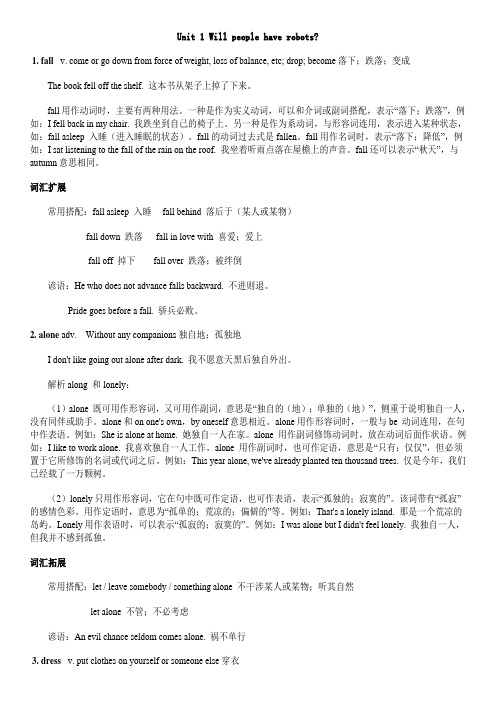
Unit 1 Will people have robots?1. fall v. come or go down from force of weight, loss of balance, etc; drop; become 落下;跌落;变成The book fell off the shelf. 这本书从架子上掉了下来。
fall用作动词时,主要有两种用法。
一种是作为实义动词,可以和介词或副词搭配,表示“落下;跌落”,例如:I fell back in my chair. 我跌坐到自己的椅子上。
另一种是作为系动词,与形容词连用,表示进入某种状态,如:fall asleep 入睡(进入睡眠的状态)。
fall的动词过去式是fallen。
fall用作名词时,表示“落下;降低”,例如:I sat listening to the fall of the rain on the roof. 我坐着听雨点落在屋檐上的声音。
fall还可以表示“秋天”,与autumn意思相同。
词汇扩展常用搭配:fall asleep 入睡fall behind 落后于(某人或某物)fall down 跌落fall in love with 喜爱;爱上fall off 掉下fall over 跌落;被绊倒谚语:He who does not advance falls backward. 不进则退。
Pride goes before a fall. 骄兵必败。
2. alone adv. Without any companions 独自地;孤独地I don't like going out alone after dark. 我不愿意天黑后独自外出。
解析along 和lonely:(1)alone 既可用作形容词,又可用作副词,意思是“独自的(地);单独的(地)”,侧重于说明独自一人,没有同伴或助手。
alone和on one's own,by oneself意思相近。
人教版八年级下册各单元英语语法解析知识重点总结
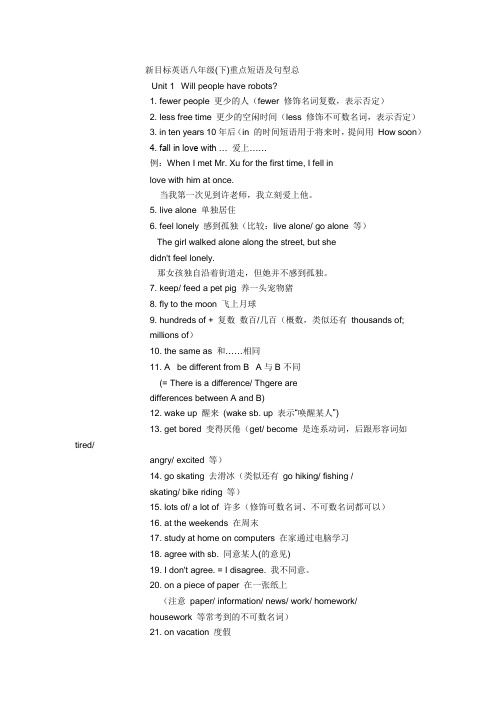
新目标英语八年级(下)重点短语及句型总Unit 1 Will people have robots?1. fewer people 更少的人(fewer 修饰名词复数,表示否定)2. less free time 更少的空闲时间(less 修饰不可数名词,表示否定)3. in ten years 10年后(in 的时间短语用于将来时,提问用How soon)4. fall in love with … 爱上……例:When I met Mr. Xu for the first time, I fell inlove with him at once.当我第一次见到许老师,我立刻爱上他。
5. live alone 单独居住6. feel lonely 感到孤独(比较:live alone/ go alone 等)The girl walked alone along the street, but shedidn't feel lonely.那女孩独自沿着街道走,但她并不感到孤独。
7. keep/ feed a pet pig 养一头宠物猪8. fly to the moon 飞上月球9. hundreds of + 复数数百/几百(概数,类似还有thousands of;millions of)10. the same as 和……相同11. A be different from B A与B不同(= There is a difference/ Thgere aredifferences between A and B)12. wake up 醒来(wake sb. up 表示“唤醒某人”)13. get bored 变得厌倦(get/ become 是连系动词,后跟形容词如tired/angry/ excited 等)14. go skating 去滑冰(类似还有go hiking/ fishing /skating/ bike riding 等)15. lots of/ a lot of 许多(修饰可数名词、不可数名词都可以)16. at the weekends 在周末17. study at home on computers 在家通过电脑学习18. agree with sb. 同意某人(的意见)19. I don't agree. = I disagree. 我不同意。
八年级新目标Unit 1 Will people have robots(知识点和测试题)
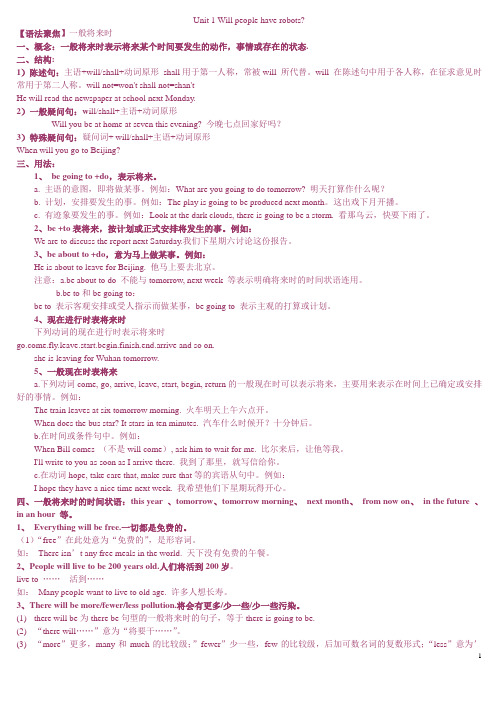
Unit 1 Will people have robots?【语法聚焦】一般将来时一、概念:一般将来时表示将来某个时间要发生的动作,事情或存在的状态.二、结构:1)陈述句:主语+will/shall+动词原形shall用于第一人称,常被will 所代替。
will 在陈述句中用于各人称,在征求意见时常用于第二人称。
will not=won't shall not=shan'tHe will read the newspaper at school next Monday.2)一般疑问句:w ill/shall+主语+动词原形Will you be at home at seven this evening? 今晚七点回家好吗?3)特殊疑问句:疑问词+ will/shall+主语+动词原形When will you go to Beijing?三、用法:1、be going to +do,表示将来。
a. 主语的意图,即将做某事。
例如:What are you going to do tomorrow? 明天打算作什么呢?b. 计划,安排要发生的事。
例如:The play is going to be produced next month。
这出戏下月开播。
c. 有迹象要发生的事。
例如:Look at the dark clouds, there is going to be a storm. 看那乌云,快要下雨了。
2、be +to表将来,按计划或正式安排将发生的事。
例如:We are to discuss the report next Saturday.我们下星期六讨论这份报告。
3、be about to +do,意为马上做某事。
例如:He is about to leave for Beijing. 他马上要去北京。
注意:a.be about to do 不能与tomorrow, next week 等表示明确将来时的时间状语连用。
新目标英语八年级Go for it下册1-5单元 (Units 1-5课文 翻译)
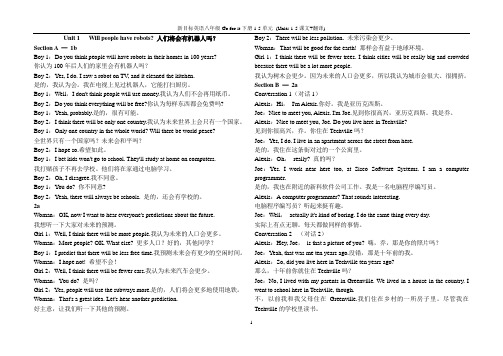
Unit 1 Will people have robots? 人们将会有机器人吗?Section A —1bBoy 1:Do you think people will have robots in their homes in 100 years?你认为100年后人们的家里会有机器人吗?Boy 2:Yes, I do. I saw a robot on TV, and it cleaned the kitchen.是的,我认为会。
我在电视上见过机器人,它能打扫厨房。
Boy 1:Well,I don't think people will use money.我认为人们不会再用纸币。
Boy 2:Do you think everything will be free?你认为每样东西都会免费吗?Boy 1:Yeah, probably.是的,很有可能。
Boy 2:I think there will be only one country.我认为未来世界上会只有一个国家。
Boy 1:Only one country in the whole world? Will there be world peace?全世界只有一个国家吗?未来会和平吗?Boy 2:I hope so.希望如此。
Boy 1:I bet kids won't go to school. They'll study at home on computers.我打赌孩子不再去学校。
他们将在家通过电脑学习。
Boy 2:Oh, I disagree.我不同意。
Boy 1:You do? 你不同意?Boy 2:Yeah, there will always be schools. 是的,还会有学校的。
2aWoman:OK, now I want to hear everyone's predictions about the future.我想听一下大家对未来的预测。
Unit 1 Will people have robots
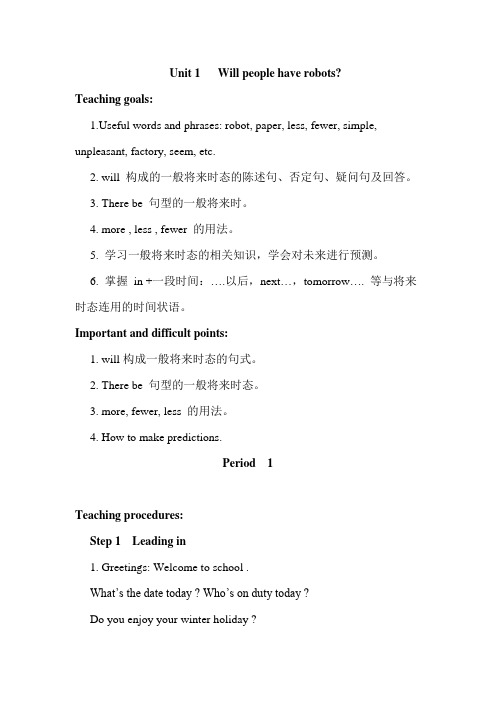
Unit 1 Will people have robots?Teaching goals:eful words and phrases: robot, paper, less, fewer, simple, unpleasant, factory, seem, etc.2. will 构成的一般将来时态的陈述句、否定句、疑问句及回答。
3. There be 句型的一般将来时。
4. more , less , fewer 的用法。
5. 学习一般将来时态的相关知识,学会对未来进行预测。
6. 掌握in +一段时间:….以后,next…,tomorrow…. 等与将来时态连用的时间状语。
Important and difficult points:1. will构成一般将来时态的句式。
2. There be 句型的一般将来时态。
3. more, fewer, less 的用法。
4. How to make predictions.Period 1Teaching procedures:Step 1 Leading in1. Greetings: Welcome to school .What’s the date today ? Who’s on duty today ?Do you enjoy your winter holiday ?Do you finish your homework ?Do you want to live on the moon ?Can you guess what will happen in ten years ?Collect the Ss’ answers and say something about their predictions.Step 2 Pre-taskSB Page 2, 1a.1. Look at the picture: How will the world be different in the future, 100 years from now ?We’re going to talk about sth. in 100 years.2. Read each predictions to the class .Explain the new vocabulary .3. Read the instructions .Make sure Ss know what they should do .4. Do it by themselves.5. Talk about the answers with the class.Explain :一般将来时态构成: will / be going to + 动词原形Step 3 While-taskSB Page 2 ,1b .1. Practise reading the six predictions.2. Read the instructions to Ss. Circle the things you hear on the recording.3. Play the tape twice.4. Play the tape a third time .At the same time, check the answers.SB Page 2 , 1c .1. Pay attention to the dialogues.2. Read the dialogues fluently.3. Pairwork. Work in pairs to make predictions according to the sample.4. Ask several pairs to share their conversations to the class.SB Page 3, 2a & 2b.1. Read the predictions.2. Read the instructions and point out the sample answer.3. Play the tape twice. Ss circle the word they hear in each sentences: more, less , fewer.4. Check the answers.学生探究: less, fewer 的区别。
Unit 1 Will people have robots教案1
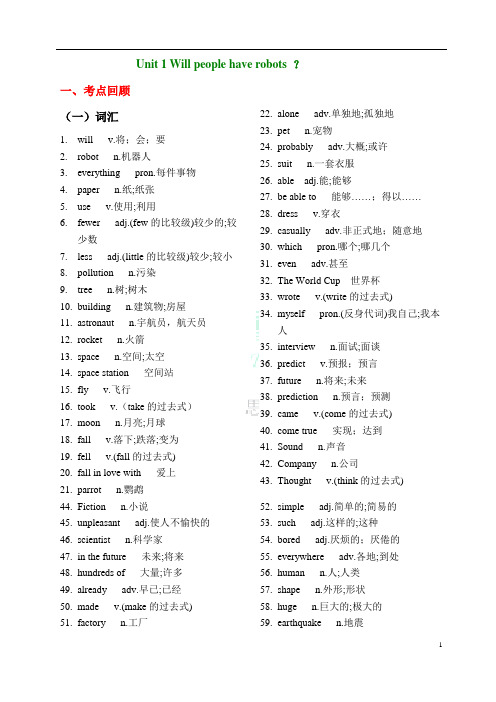
Unit 1 Will people have robots ?一、考点回顾(一)词汇1.will v.将;会;要2.robot n.机器人3.everything pron.每件事物4.paper n.纸;纸张e v.使用;利用6.fewer adj.(few的比较级)较少的;较少数7.less adj.(little的比较级)较少;较小8.pollution n.污染9.tree n.树;树木10.building n.建筑物;房屋11.astronaut n.宇航员,航天员12.rocket n.火箭13.space n.空间;太空14.space station 空间站15.fly v.飞行16.took v.(take的过去式)17.moon n.月亮;月球18.fall v.落下;跌落;变为19.fell v.(fall的过去式)20.fall in love with 爱上21.parrot n.鹦鹉22.alone adv.单独地;孤独地23.pet n.宠物24.probably adv.大概;或许25.suit n.一套衣服26.able adj.能;能够27.be able to 能够……;得以……28.dress v.穿衣29.casually adv.非正式地;随意地30.which pron.哪个;哪几个31.even adv.甚至32.The World Cup 世界杯33.wrote v.(write的过去式)34.myself pron.(反身代词)我自己;我本人35.interview n.面试;面谈36.predict v.预报;预言37.future n.将来;未来38.prediction n.预言;预测39.came v.(come的过去式)e true 实现;达到41.Sound n.声音pany n.公司43.Thought v.(think的过去式)44.Fiction n.小说45.unpleasant adj.使人不愉快的46.scientist n.科学家47.in the future 未来;将来48.hundreds of 大量;许多49.already adv.早已;已经50.made v.(make的过去式)51.factory n.工厂52.simple adj.简单的;简易的53.such adj.这样的;这种54.bored adj.厌烦的;厌倦的55.everywhere adv.各地;到处56.human n.人;人类57.shape n.外形;形状58.huge n.巨大的;极大的59.earthquake n.地震60.snake n.蛇61.possible adj.可能的62.electric adj.电的;导电的63.toothbrush n.牙刷64.seem v.像是;似乎65.impossible adj.不可能的;不会发生的66.housework n.家务;家务事67.rating n.级别;等级(二)重点短语1. make predictions 做预测2. free time 空闲时间3. fly…to…乘坐…飞往…4. on a space station 在太空站上5. I disagree. 我不同意.6. fall/be in love with sb. 与sb.相爱7. keep pets 养宠物8. be able to 能够9. predict the future 预测未来10. come true 实现11. see sb. do sth. 看见sb.做某事(的全过程)doing sth. 看见sb.正在做某事(片断)12. help sb. with sth. 帮助某人做某事13. hundreds of 数以百计的14. try to do sth. 尽力做某事15. look like 看上去长的像…16. look for 寻找17. 一段时间+ from now (从现在起)…之后from now on = in the future 今后18.help sb. do/with sth 帮助做…19.make sb do sth 使某人做…make sb + adj 使某人怎么样了…20.it is … (for sb) to do sth 对某人来说做… 怎么样21.the same … as 和… 一样22.over and over again反复。
willpeoplehaverobots单元教学设计方案

willpeoplehaverobots单元教学设计方案unit 1will people have robots?单元教学设计方案一、教学内容:unit 1 will people have robots? 二、教材及学情分析:本单元围绕“谈论问题” 及“提出建议”这两个话题,设计了相关的语言背景。
section a1a-2c呈现了本单元的重点语法现象一般将来时表示猜测的用法,然后设计了听力活动、结对活动以及小组活动,从听说角度训练了本单元的核心句型,并在grammar focus 中进行了归纳总结。
section a3a-part4 所涉及的活动则先通过与一般过去式和一般现在时的对比,让生进一步了解、掌握一般将来时的结构与用法。
section b1a-2b 先通过词类的分组活动,呈现了听力材料中所要用到的词汇;接着设计了两个听力活动,分别从两个层面,从宏观到细节,帮助学生掌握一般将来时的意义、结构和用法。
2c- part 4 设计的活动,则通过说、读、写的活动,对学生的三种时态的运用能力进行了综合训练,旨在帮助学生形成创造性地运用所学三种时态的能力。
self check 让学生通过活动对自己遣词造句能力及语言综合能力进行了自我评价。
课后所选的阅读材料依然紧扣本单元的语言目标,学习掌握基本的阅读策略,即根据文章标题和相关图片预测文章的大体内容,以获取更多信息的能力,从而让语篇教学成为实现情感态度与价值观目标的有效载体,通过描述未来,调动学生学习积极性,发挥想象力,帮助其树立正确的人生观和价值观:只有付出,才有收获。
八年级上unit 3 what are you doing for vacation? unit 10 i’m going tobe a basketball player. 已经学习了一般将来时,学生已经学会用现在进行时谈论未来的计划,用be going to 句型谈论未来的打算。
新目标英语八年级下册Unit1 Will people have robots?讲解与练习
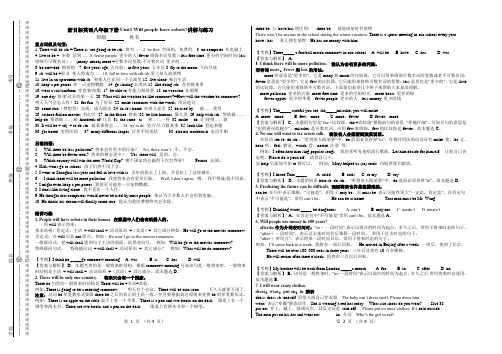
第 1 页 (共4 页) 第 2 页 (共4 页)学校 姓名 班级 考场 考号---------------------------------○密------------------ -------------------○封----------------------------- -- --○线----------------------------※※※※※※※※※※※※※※※答※※※※※※※※※※※※※※※※※※题※※※※※※※※※※※※※※※※线※※※※※※※※※※※※※新目标英语八年级下册Unit1 Will people have robots?讲解与练习班级 姓名重点词组及句型:1. There will be sth.= There is /are going to be sth. 将有……2. be free 空闲的,免费的3. on computer 在电脑上4. live to be + 岁数 活到……5. fewer people 更少的人(fewer 修饰名词复数);less free time 更少的空闲时间(less修饰不可数名词); (many /much) more +可数名词复数/不可数名词 更多的……6. be crowded 拥挤的7. five years ago 五年前;in five years 五年后8. fly to the moon 飞向月球9. sb. will be +职业 某人将成为……10. fall in love with sth./sb.爱上某人或某物11. live in an apartment with sb. 和某人住在同一个公寓里12. live alone 独自生活13. keep a pet parrot 养一只宠物鹦鹉 14. go skating 去滑冰15. like doing sth. 喜欢做某事16. wear a suit\uniform 穿套装\制服 17. be able to 有能力做某事 18. on vacation 在假期19. one day 将来\过去的某一天 20. What will the weather be like tomorrow?=How will the weather be tomorrow?明天天气会怎么样?21. for fun 为了好玩 22. make sentences with the words 用词造句23. come true (梦想等)实现;成为现实 24. in sb's home 在某人家里 25. be used by 被……使用26. science fiction movies 科幻片 27. in the future 将来 28. be like humans 像人类 29. help with sth. 帮助做……help do 帮助做…… 30. hundreds of 几百 31. the same...as... 和……一样 32. make ... do 让\使得……做33. It will be + adj. + to do sth. 做某事将会…… 34. try to do 努力\尽力做某事 35. look like 看起来像36. get bored 变得厌烦 37. many different shapes 许多不同形状 38. electric toothbrush 电动牙刷日常用语:1. ---Will there be less pollution? 将来会有更少的污染?---No, there won’t. 不,不会。
初中英语《Unit1Willpeoplehaverobots》单元教学设计以及思维导图

测和设想。 5、能够运用所给信息,如标题,图片等预测文章大意。 知识目标: 通过本单元的学习,学生能: ·熟练掌握以下单词:will, robot, everything, paper, use, fewer, less, tree, building, space, fly, took, moon, fall, fell, alone, pet, probably, able, dress, which, even, wrote. 能在文章中识别并在听力对话中听 出以下词汇及表达:pollution, astronaut, rocket, fall in love with. ·熟练掌握本单元 Grammar Focus 中的句型以及介绍自己如何到达 目的地的相关句子: Will there be less pollution ? No, there won’t . There will be more pollution. Will there be fewer trees ? Yes, there will. Kids won’t go to school . Kids will study at home on computer. 学习策略: 通过本单元的学习,学生能: 1、在学习词汇、语法的过程中,感知回忆、联想、想象等识记策 略。 2、听录音前,通过观看 PPT 呈现的图片及浏览相关文字信息,体 验、训练“预测听力相关内容”的策略。 3、在听力过程中,体验、实践“在泛听、精听的过程中抓关键句”的
Unit 1 Will people have robots
适用年级
八年级
所需时间
课内共用 4 课时,每周 5 课时;课外共用 1 课时
主题单元学习概述
本单元是鲁教版八年级上册第一单元,是承前启后的一个单元,它
Unit1(1)Will people have robots

Will people have robots in their homes ? Will people use money in 100 years ? Yes, they will.
Will books be only on computer ?
Will kids go to school ? Will they study at home ? Will there only be one country ? No, they/ there won’t .
Will people live to be 200 years old ?
in the future
Will people have robots
in people’s homes ?
Yes ,they will. People will have robots in their homes No ,they won’t=will not
in the future
There will only be one country. People will live to be 200 years old.
Will
every
home have a
car?
Yes ,they will They will have a car.
Will these be true in the future?
in the future
robot
People will have robots in their homes.Βιβλιοθήκη in the future
People won’t use money. Everything will be free.
八年级(下)英语《Unit1 Will people have robots》课件2

be used by sb
被某人所使用
1 实现 2 最大的一家电影公司 3 看到演员说话 4 被大多数人所使用 5 哪一个国家将赢得下一届世界杯? 6 明天的天气会怎么样? 7 哪些电影明年会获奖? 8 20年后,青少年会做什么娱乐活动? 1 come true 2 one of the biggest movie companies 3 see actors talk. 4 be used by most people 5 Which country will win the next World Cup? 6 What will the weather be like tomorrow? 7 Which movies will win awards next year? 8 What will teenagers do for fun twenty years from now?
美国一家最大的电影公司的头预测没有人将看到演员说话。
one of +复数 ---之一 see actors talk -see sb do 看到某人做某事 4 He thought that computers would never be used by most people.
他认为计算机不会被大多数人使用.
3. I need to
4. We have to
smart for my job interview.
面试;面谈
a uniform to school.
5. One day people will fly to the moon for va and translate the sentences. 1 Predicting the future can be difficult. 预测未来会很困难。 动名词担当主语 2 There are many famous predictions that never came true.
初中英语《Unit1Willpeoplehaverobots》单元教学设计以及思维导图2
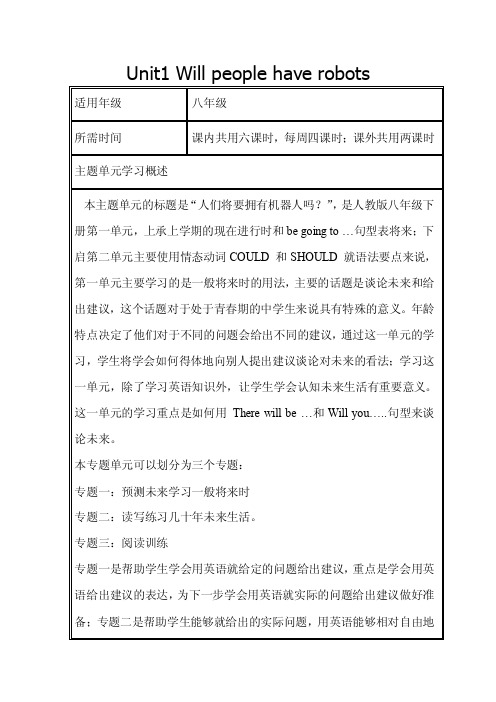
乃至书面给出建议。专题三是研究性学习专题,在以上两个专题学习的 基础上,让学生研究总结利用好一般将来谈论未来。 主要的学习方式:情境学习,问题学习,合作学习,探究学习。 预期的学习成果:学生学会较自由地运用英语谈论未来。 主题单元规划思维导图
主题单元学习目标 语言知识: 1.Master words “robot,pollution...” and the sentences “There will be less pollution.Will there be the...? Yes, there will. No, there won’t.
fiction movies? 2. What can the robots do for people? 2).Read paragraph 2 answer:
Q: 1. How long do some scientists think people will have robots in their homes?
专题三
阅读训练
所需课时
2 课时
专题学习目标
1.Talking about “robots in the future” Using the words and the prases. The words: unpleasant,scientist, however, hundreds of, already, factory, simple, such, everywhere, human, shape , snake, shape, possible, electric, seem, impossible, housework. The prases : the same as, make …do…, to take…, to help do…, to help with… 2.Teaching Ss to learn to guess the new words in the sentence. Consolidating the Simple Future Tense by reading.
八年级下册英语一到三单元的作文例文
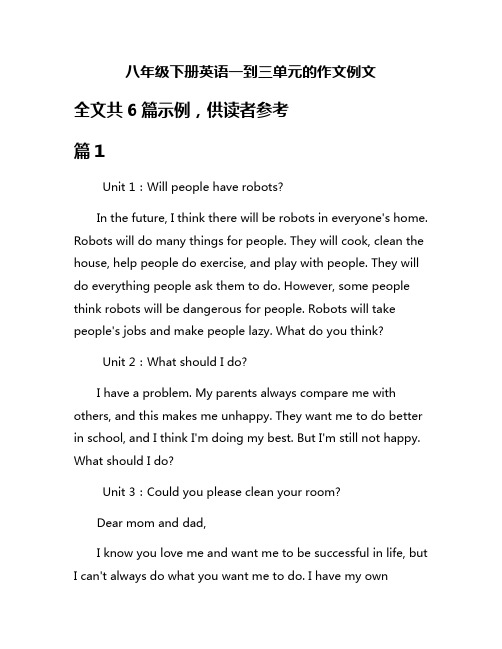
八年级下册英语一到三单元的作文例文全文共6篇示例,供读者参考篇1Unit 1:Will people have robots?In the future, I think there will be robots in everyone's home. Robots will do many things for people. They will cook, clean the house, help people do exercise, and play with people. They will do everything people ask them to do. However, some people think robots will be dangerous for people. Robots will take people's jobs and make people lazy. What do you think?Unit 2:What should I do?I have a problem. My parents always compare me with others, and this makes me unhappy. They want me to do better in school, and I think I'm doing my best. But I'm still not happy. What should I do?Unit 3:Could you please clean your room?Dear mom and dad,I know you love me and want me to be successful in life, but I can't always do what you want me to do. I have my owninterests and hobbies, and I need some free time to do the things I like. I also need to clean and tidy my room and do some chores, but I think it's unfair that I have to do everything by myself. Could you please help me sometimes?Thank you.Sincerely,篇2My name is Li Ming. I am a student in Class 3,Grade 8. I am 14 years old and I am from Beijing.My father is a doctor and my mother is a teacher.I have a sister and a brother. My sister is a student and my brother is a child. I like playing basketball and listening to music. My favorite subject at school is science. I want to be an engineer when I grow up.I love my family and I am proud of them. They are the most important people in my life.篇3My School LifeI am currently studying inand have completed Units 1 to 3 of the English course. In this article, I will write something about my school life and share some of my experiences.In the first unit, we learned about different school clubs and how to participate in them. I joined the English club because I love English and want to improve my speaking skills. In the club, we often have conversations and roleplays in English, which is very helpful for me.In the second unit, we learned about different festivals and celebrations around the world. I learned that different cultures have different ways of celebrating festivals. For example, in China, we usually eat dumplings during the Spring Festival, while in the United States, people usually eat turkey on Thanksgiving.In the third unit, we learned about health and fitness. This unit taught me the importance of keeping healthy, such as eating healthy food, exercising regularly, and getting enough sleep. I try to follow these tips in my daily life and feel much better now.Overall, I have really enjoyed studying these three units and have learned a lot. I hope to learn more interesting things in the future.篇4Unit 1: My Dream SchoolI would like my dream school to be a place that is both fun and challenging. The classrooms would be filled with natural light and there would be lots of green space for us to relax in.I think it's important to have a good variety of lessons, so we could choose the ones we're interested in. For example, we could have classes in cooking, art and music. There would also be a lot of opportunities for us to learn practical skills, like how to fix a bike or build a website.My dream school would also place a strong emphasis on teamwork and cooperation. We would have projects and activities where we work together to solve problems and achieve goals.In conclusion, my dream school would be a place where we can learn, grow and have fun.Unit 2: How to Keep FitTo keep fit, we need to eat a balanced diet and exercise regularly. Eating plenty of fruits, vegetables and whole grains is important, as well as limiting our intake of sugar and saturatedfat. Exercising for at least 30 minutes most days of the week can help us stay healthy and strong. This could include activities like walking, cycling or swimming.It's also important to get enough sleep and manage our stress levels. Staying hydrated by drinking plenty of water is another key to good health.In addition, we should limit our exposure to harmful substances, such as cigarettes and alcohol.Regular checkups with a doctor are important for maintaining good health and catching any potential health problems early.In conclusion, by making small changes to our lifestyles, we can greatly improve our chances of staying healthy and living a long life.Unit 3: Online ShoppingIn conclusion, online shopping has some advantages, such as convenience and a wider choice, but it also has some disadvantages, such as the risk of fraud and the inability to try products before buying. Therefore, it's important to consider both the pros and cons before making a purchase.篇5Dear [],I hope this letter finds you well. I'm writing to tell you about my exciting plans for the summer vacation.As you know, I have always been passionate about art, and this summer, I have signed up for an intensive painting course at the local art studio. I can't wait to learn new techniques and develop my skills under the guidance of professional artists.In addition to painting, I also plan to spend some time reading and exploring different cultures. I have recently finished reading "The Catcher in the Rye" and found it to be a profound and thoughtprovoking novel. I would love to discuss it with you and hear your thoughts on it.Furthermore, I am determined to stay active this summer. I have joined a local sports team and will be participating in various sports activities, such as basketball and swimming. I believe that a healthy body and mind are essential for leading a fulfilling life.Lastly, I would like to visit my grandparents during the vacation. They live in the countryside, and I miss spending time with them and enjoying the peace and tranquility of nature.I hope you have a wonderful summer filled with joy and adventure. Don't forget to stay in touch and let me know how you're doing.Best regards,My unforgettable experienceI still remember the day when I went on a school trip to the countryside. It was a sunny Saturday, and my classmates and I were all excited to embark on this new adventure.We arrived at the countryside early in the morning and were immediately greeted by the fresh air and beautiful scenery. We spent the day participating in various activities, such as farming, fishing, and cooking traditional dishes.One of the highlights of the trip was learning how to make traditional Chinese dumplings. Under the guidance of our teacher, we mixed the flour, kneaded the dough, and cut it into small pieces. Then, we rolled out the dough and filled it with minced meat and vegetables. Although it was a bit challengingat first, we all had a lot of fun and managed to make some delicious dumplings.After lunch, we went on a hike through the mountains. The scenery was breathtaking, and we were able to see some wild animals, such as squirrels and birds. It was an amazing experience to be in nature and appreciate its beauty.In the evening, we gathered around a bonfire and sang songs. We shared stories and laughed together, creating memories that will last a lifetime.Overall, the school trip to the countryside was an unforgettable experience for me. I learned a lot about rural life and traditions, and also made some new friends. It was a great opportunity to step out of our comfort zones and try new things, and I am grateful for the memories that I will cherish forever.How to improve your English speaking skillsEnglish is becoming an increasingly important language in the world, and having good speaking skills is essential for communicating effectively. If you want to improve your English speaking skills, here are some tips to help you get started:1. Pace yourself: Slow down and enunciate clearly when speaking English. This will help you to be understood more easily and will also give you time to think about what you want to say.2. Practice regularly: The more you speak English, the more confident and fluent you will become. Try to speak English as often as possible, whether it's with friends, family, or English language exchange partners.3. Record yourself: By recording yourself speaking English, you can listen to your own pronunciation and intonation and identify areas where you need to improve.4. Read aloud: Reading aloud helps to improve your fluency and pronunciation. Choose something that interests you, such as a novel, magazine, or newspaper, and read it aloud.5. Watch English movies and TV shows: This can help you to improve your listening skills and become more familiar with the rhythm and intonation of English speech.6. Join a conversation class: Taking a conversation class can provide you with structured practice and feedback from a teacher and other students.7. Think in English: Try to use English to describe your thoughts and ideas, even if you're not speaking to anyone. This will help to train your brain to think in English.In conclusion, improving your English speaking skills takes time and effort, but with regular practice and a positive attitude, you can become a more confident and fluent English speaker.篇6My Favorite SportAs an student, I love sports which make me stressedrelieved and talenteddeveloped. Among various sports, my favorite one is basketball.Basketball is not only a sport, but also a way of life. It needs teamwork, skills, tactics, and strategies. It also needs passion, confidence, and perseverance. When I play basketball, I feel the joy of movement, the challenge of competition, and the friendship of cooperation. I learn how to respect my opponents, how to trust my teammates, and how to enjoy the victory.Basketball has changed me a lot. It has made me stronger both physically and mentally. It has given me more confidence and courage. It has also brought me many friends and memories.Basketball is not only my hobby, but also my dream. I hope one day I can become a professional basketball player and represent my country in the world stage.So, that’s my favorite sport. What’s yours?。
初中英语《Unit1Willpeoplehaverobots》单元教学设计以及思维导图
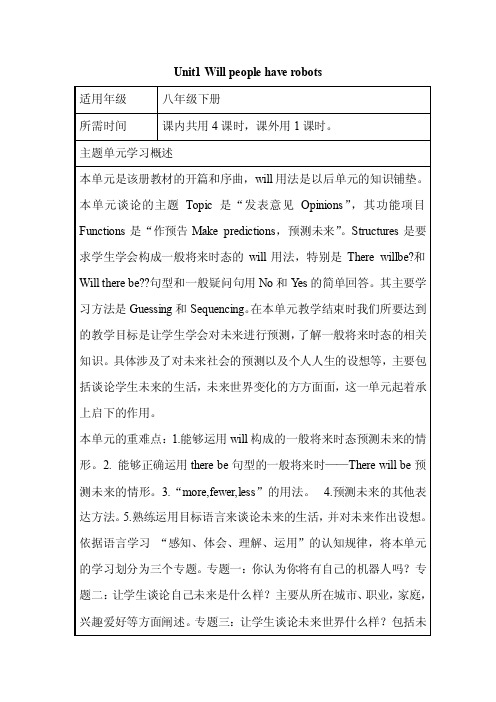
上启下的作用。
本单元的重难点:1.能够运用 will 构成的一般将来时态预测未来的情
形。2. 能够正确运用 there be 句型的一般将来时——There will be 预
测未来的情形。3.“more,fewer,less”的用法。 4.预测未来的其他表 达方法。5.熟练运用目标语言来谈论未来的生活,并对未来作出设想。
对应课标 1.对英语学习表现出积极性和初步的自信心。 2.能听懂有关熟悉话题的谈话,并能从中提取信息和观点。 3.能有效地询问信息和请求帮助。 4.能以小组讨论的方式起草和修改作文。 5.能预测未来,参与简单的角色扮演等活动。 6.能尝试使用适当的学习方法,克服学习中遇到的困难。
1.Do you think you will have your own robot?
评价要点
1.能用适当的语音语调正确朗读本单元中的句型、对 话和短文。 2.根据 3a 阅读语篇任务所建构的篇章结构,学生能 复述 3a 并写一篇关于自己未来生活的文章。。 3.能运用所学句型说出对未来社会的预测以及个人 人生的设想等。 4.能够阅读文章,理解大意,找出相关信息。 5.通过学生自评,学生互评,教师评价等对上述内容 进行评价
主题单元问题 2.What will your life be like in the future?
设计
3.What will the world be like in the future?
专题一:1.Do you think you will have your own robot? ( 2 课时)
专题划分
专题二:2.What will your life be like in the future? ( 1 课时)
Unit-1-Will-people-have-robots知识点总结
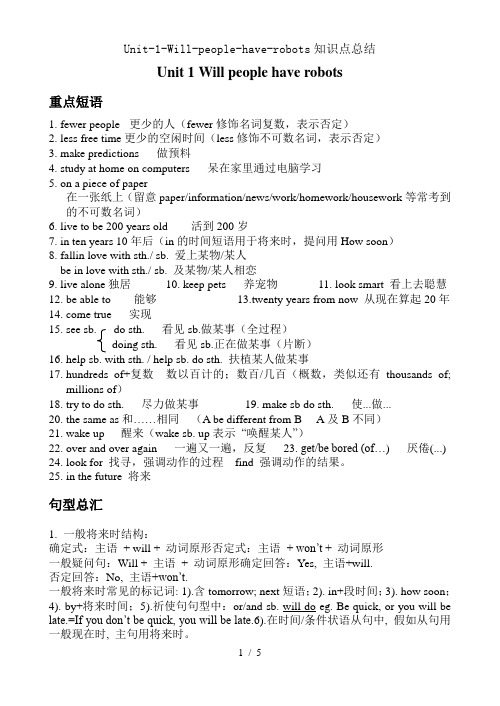
Unit 1 Will people have robots重点短语1. fewer people 更少的人(fewer修饰名词复数,表示否定)2. less free time更少的空闲时间(less修饰不可数名词,表示否定)3. make predictions 做预料4. study at home on computers 呆在家里通过电脑学习5. on a piece of paper在一张纸上(留意paper/information/news/work/homework/housework等常考到的不可数名词)6. live to be 200 years old 活到200岁7. in ten years 10年后(in的时间短语用于将来时,提问用How soon)8. fallin love with sth./ sb. 爱上某物/某人be in love with sth./ sb. 及某物/某人相恋9. live alone独居10. keep pets 养宠物11. look smart 看上去聪慧12.be able to 能够13.twenty years from now 从现在算起20年e true 实现15.see sb. do sth. 看见sb.做某事(全过程)doing sth. 看见sb.正在做某事(片断)16.help sb. with sth. / help sb. do sth. 扶植某人做某事17.hundreds of+复数数以百计的;数百/几百(概数,类似还有thousands of;millions of)18.try to do sth. 尽力做某事19. make sb do sth. 使...做...20.the same as和……相同(A be different from B A及B不同)21.wake up 醒来(wake sb. up表示“唤醒某人”)22.over and over again 一遍又一遍,反复23. get/be bored (of…) 厌倦(...)24.look for 找寻,强调动作的过程find 强调动作的结果。
- 1、下载文档前请自行甄别文档内容的完整性,平台不提供额外的编辑、内容补充、找答案等附加服务。
- 2、"仅部分预览"的文档,不可在线预览部分如存在完整性等问题,可反馈申请退款(可完整预览的文档不适用该条件!)。
- 3、如文档侵犯您的权益,请联系客服反馈,我们会尽快为您处理(人工客服工作时间:9:00-18:30)。
Unit 1 Will people have robots?1.fewer people 更少的人(fewer修饰名词复数,表示否定)2.less free time 更少的空闲时间(less修饰不可数名词,表示否定)3.in ten years 10年后(in的时间短语用于将来时,提问用How soon)4.fall in love with…爱上…例:When I met Mr. Xu for the first time, I fell in love with him at once当我第一次见到许老师,我立刻爱上他5.live alone 单独居住6.feel lonely 感到孤独(比较:live alone/go along等)The girl walked alone along the street, but she didn‘t feel lonely那女孩独自沿着街道走,但她并不感到孤独7.keep/feed a pet pig 养一头宠物猪8.fly to the moon 飞上月球9.hundreds of +复数数百/几百(概数,类似还有thousands of; millions of)10.the same as 和……相同11.A be different from B A与B不同(=There is a difference/Thgere are differences between A and B)12.wake up 醒来(wake sb. up表示―唤醒某人‖13.get bored 变得厌倦(get/become是连系动词,后跟形容词如tired/angry/excited等)14.go skating 去滑冰(类似还有go hiking/fishing /skating/bike riding等)15.lots of/a lot of 许多(修饰可数名词、不可数名词都可以)16.at the weekends 在周末17.study at home on computers 在家通过电脑学习18.agree with sb. 同意某人(的意见)19.I don‘t agree. = I disagree.我不同意20.on a piece of paper 在一张纸上(注意paper/information/news/work/homework/housework等常考到的不可数名词)21.on vacation 度假22.help sb with sth/help sb do sth 帮助某人做某事23.many different kinds of goldfish 许多不同种金鱼24.live in an apartment 住在公寓里/live on the twelfth floor 住在12楼25.live at NO.332,Shanghai Street 住在上海路332号26.as a reporter 作为一名记者27.look smart 显得精神/看起来聪明28.Are you kidding? 你在骗我吗29.in the future 在将来/在未来30.no more=not …anymore不再(强调多次发生的动作不再发生)31.no longer=not… any longer不再(强调状态不再发生)32.besides(除…之外还,包括)与except =but(除…之外,不包括)33.be able to与can 能、会(be able to用于各种时态,而can只能用于一般现在时态和一般过去时态中;have to用于各种时态,而must只能用于一般现在时态)例如: 1.I have been able to/will be able to speak two languages. (不可以用can)2. had to stay at home/ will have to (不可以用must)34.be big and crowded 大而且拥挤34.be in college 在上大学35.live on a space station 住在空间站36.dress casually 穿得很随意casual clothing 休闲服饰37.win the next World Cup 赢得世界杯win award 获僵e true 变成现实39.take hundreds of years 花几百年的时间40.be fun to watch 看起来有趣41.over and over again 一次又一次42.be in different shapes 形状不同43.twenty years from now 今后20年44.本单元目标句型:1.What do you think life will be like in 1000 years?2.There will be fewer trees、more buildings and less pollution in the future.fewer;less表示否定之意,分别修饰可数名词和不可数名词;more二者都可以修饰。
3.Will kids go to school? No, they won‘t/Yes, they will。
4.Predicting the future can be difficult.5.I need to look smart for my job interview.6.I will be able to dress more casually.7.I think I‘ll go to Hong Kong on vacation, and one day I might even visit Australia.8.What will teenagers do for fun twenty years from now?9.That may not seem possible now, but computers, space rockets and even electric toothbrushes seemedimpossible a hundred years ago.本单元语法讲解一般将来时表示将要发生的动作或存在的状态。
本时态标志词:1.含tomorrow; next短语;2.in+段时间;3.how soon;4.by+将来时间;5.by the time sb.do…6.祈使句句型中:or/and sb. will do7.在时间/条件状语从句中, 如果从句用一般现在时, 主句用将来时8.another day比较be going to 与will:be going to 表示近期、眼下就要发生的事情,will 表示的将来时间则较远一些。
如:He is going to write a letter tonight. He will write a book one day.2. be going to 表示根据主观判断将来肯定发生的事情,will表示客观上将来势必发生的事情。
He is seriously ill. He is going to die. He will be twenty years old.3. be going to 含有―计划,准备‖的意思,而will 则没有这个意思,如:She is going to lend us her book. He will be here in half an hour.4.在有条件从句的主句中,一般不用be going to, 而多用will, 如:If any beasts comes at you, I'll stay with you and help you.掌握了它们的这些不同,你就能很好的区分be going to与will了。
一般将来时常见的标志词1.含tomorrow; next短语;2.in+段时间;3.how soon;4. by+将来时间;5.祈使句句型中:or/and sb. will do例Be quick, or you will be late=If you don‘t be quick, you will be late6.在时间/条件状语从句中, 如果从句用一般现在时, 主句用将来时(另见Unit 5)Unit 2 What should I do?1.too loud 太大声2.out of style 过时的3.in style 流行的4.call sb up=ring sb.up=call/ring/phone sb. 给…..打电话5.enough money 足够的钱(enough修饰名词时不必后置)6.busy enough 够忙(enough修饰形容词或副词时必须后置)7. a ticket to/for a ball game 一张球赛的门票注意:the key to the lock/the key(answer)r to the question)/the solution to the problem .此处几个短语不能用of表示所有格8.talk about 谈论9.on the phone 用电话10.pay for 付款11.sp end…on +sth.=spend...( in) doing sth. 在…花钱12.It takes sb. sometime to do sth. 某人做某事花…的时间13.borrow …from从….借( 借进来)14.lend…to 把…借给(借出去)15.You can keep the book for a week 你可以借这本书一周。
(不用borrow或lend)16.buy sth for sb 为……买东西17.tell sb to do /not to do sth.sth 告诉某人做某事18.want sb. to do sth.=would like sb. to do 想某人做某事19.find out 发现;查清楚;弄明白20.play one‘s stereo放录象21.fail the test=not pass the test 考试不及格22.fail in (doing) sth…在...上失败,变弱23.succeed in (doing) sth 在...方面成功24.write sb a letter/write to sb.给某人写信25.surprise sb.使某人吃惊(类似有:surprise/interest/please/amaze+某人)26.to one‘s surprise 使某人吃惊的是…..27.to one‘s joy使某人高兴的是…..28.look for a part-time job 找一份兼职的工作(不一定有结果)29.get/find a part-time job 找到一份兼职的工作(有结果)30.ask sb. for…寻求/向某人要某物31.have a bake sale 卖烧烤32.argue with sb = have an argument with sb. 与某人争吵33.have a fight with sb.=fight with 与某人打架34.drop off离去;散去;逐渐减少;死去35.prepare for…=get ready for… 为…做准备36.after-school clubs(activities) 课外俱乐部(活动)●be/get used to doing 习惯做某事●used to do 过去经常/常常做某事●be used for doing=be used to do sth. 被用于做某事37.fill… up填补;装满…be full of装满38.return sth. to sb.=give sth. back to sb. 把某物归还给某人39.get on /along well with 与…相处很好40.all kinds of 各种各样41.as much as possible=as much as you can 尽可能多42.take part in=join in 参加(某种活动/集会)43.a bit =a little 一点儿(当修饰形容词或比较级时)44.a bit of =a little 一点儿/一些(当修饰不可数名词时)45.be angry with… 生…的气46.by oneself=on one‘s own某人自己/独自地47.on the one hand 一方面48.on the other hand 另一方面49.I find/feel/think it difficult to do... 我发现/感到/认为做某事很难.50.see/hear/watch sb. doing sth. 看到/听见/注视某人正在做…51.not…until 直到…才(谓语动词一般是非延续动词)52.表示某人情绪有关的形容词用法:be/become+ upset/tired/excited/interested/worried/surprised/amazed/annoyed说明:当主语是某人时,注意后面的形容词一般是-ed结尾的单词,而当主语是某物时或修饰名词时,注意后面形容词一般是-ing结尾单词.)例如:I was surprised/interested/amazed when I heard the surprising/interesting/amazing news.53 radio advice program 电台提建议的节目54 be original 新颖的55. leave something somewhere 把某物忘在某处56 sports clothes 运动服57. the same age as=as old as 和--- 年龄一样58. the tired children 疲惫不堪的孩子59. complain about (doing sth) 抱怨、、、60.take their children from activity to activity 带着孩子参加一个接一个的活动61.try to do sth, 尽量干某事try doing sth 试着干某事62.be under too much pressure 压力太大63.a mother of three 三个孩子的妈妈64.take part in after-school clubs 参加课后俱乐部pepition starts from a very young age 竞争从很小年纪就开始了pare…with 和---比较anized activities 有组织的活动本单元目标句型:1.What‘s wrong(with you)?/What‘s the matter?2.What should I do? 我该怎么办3.You could write him a letter. 你可以给他写封信.You should say sorry to him.你应该给他道歉.4.They shouldn‘t argue.他们不应该争吵.5.Why don‘t you talk to him about it?=Why not talk to him about it?=You should/could talk to him about it.=What/How about talking to him about it.=You‘d better talk to him about it.6.The parents try to fit as much as possible into their kids lives.7.Activities include sports, language learning, music and math classes.Thirty people, including six children (six children included), went to visit the factory.8.People shouldn‘t push their children so hard.9.Parents are trying to plan their kids‘ lives for them. When these kids are adults, they might find tdifficult to plan things for themselves.Unit 3 What were you doing when the UFO arrived?1.in front of 在……的前面(外部)in the front of 在……的前面(内部)2.in the library 在图书馆3.get out of/get into 出……之外/进入4.sleep late 睡懒觉sleep well 睡得好get to sleep=fall asleep 睡着5.walk down/along 沿……走6.take off (飞机)起飞;脱下(衣帽)7.on Sunday evening 在星期日晚上注意:(特指某日如星期、假日、某月某日或某个特定的上、下午、晚上用on)8.in the tree在树上on the tree在树上9.take photos 照相10.at the train station 在火车站11.run away 跑开,逃跑12.as+adj原形as 和…一样…例如:She is (not) as beautiful as her sister. I can run as fast as he(him)13.buy/draw/make sth. for sb. 为某人买/画/制作14.walk home 走回家15.in history 在历史上16.for example 例如17.in the city of 在……市18.on the playground 在操场上19.ten minutes ago 十分钟前20.take place 发生(强调必然性)21.happen to sth./sb. 发生(强调偶然性)例如:What has happened to you?=What‘s the matter with you?=What‘s wrong with you?22.of course=sure=certainly 当然23.all over the world=around the world 遍及全世界24.outside/inside the station 在车站外/内25.next to 相邻,紧贴26.close to 接近于;在附近27.be ill in hospital/bed 生病住院/在床28.hear about/of 听说(间接听到)29.in silence 沉默不语keep silent 保持沉默30.an unusual experience 一次不寻常的经历31.have fun doing sth 干某事有乐趣have difficult time doing sth干某事有困难32.have meaning to 对—有意义33.become the first Chinese astronaut in space 成为中国第一个太空宇航员34.a national hero 一个民族英雄35. be famous all over the world 全世界出名36. for the first time 第一次本单元目标句型:What were you doing when I arrived/at that time/at 8:00 last night/from 9:00 to 10:00 yesterday?1.I was doing sth. When+一般过去时的时间状语从句...2.How about... / What about...?3.While sth./sb. was doing sth., I was doing sth....4.当不明飞行物着陆时,你正在干啥?What were you doing when the UFO landed?5.当妈妈正在做饭时,我在看电视。
